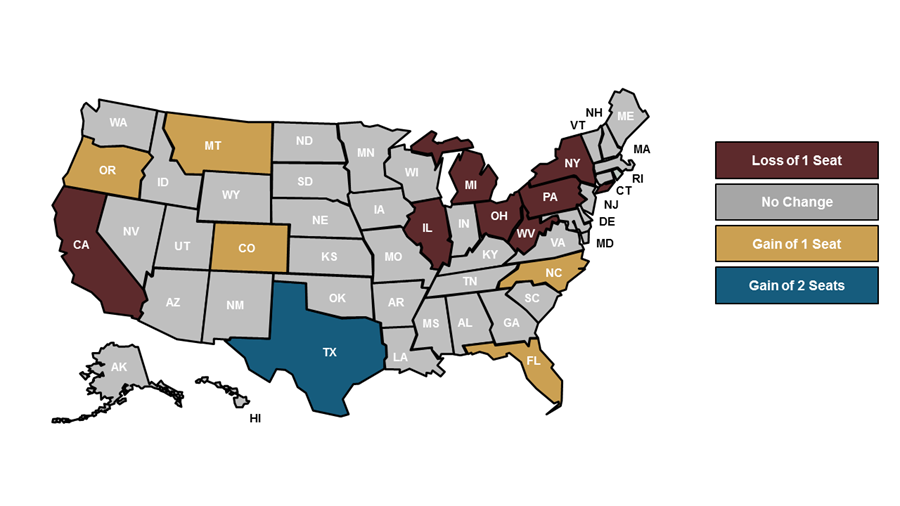Personal Wealth Management / Politics
Redistricting Congress: Gridlock’s Underappreciated Boost
Redrawing the districts should have many congresspeople rethinking major legislation.
Editors’ Note: Our political commentary is intentionally non-partisan. We favor no politician nor any political party and assess political developments solely for their potential market and economic impact.
With Tuesday’s headlines obsessing over the flurry of activity in President Joe Biden’s first 100 days in office, Washington, DC might not feel gridlocked right now. But that perception should change looking forward as the administration’s honeymoon period ends and infighting escalates. One process likely to contribute to this: House redistricting, which officially kicked off Monday when the Census Bureau announced the final tally of which states will gain and lose seats. In our view, the uncertainty this causes for politicians—redrawing district maps may mean a new electorate to court—creates a big incentive to avoid rocking the boat. That probably contributes to most legislation getting watered down (if not scrapped outright). In other words, higher uncertainty for politicians means less uncertainty for stocks, which we think is an underappreciated tailwind.
The official reapportionment results flip a handful of seats from traditionally Democratic states to traditionally Republican, but not by as much as preliminary projections suggested. Texas gains two seats instead of the three predicted by the American Redistricting Project, Florida picks up just one, and Arizona—initially projected to gain one—stands pat. Meanwhile, Rhode Island won’t lose a seat after all. Exhibit 1 shows the full national landscape as it stands now.
Exhibit 1: State Winners and Losers From Redistricting

Source: US Census Bureau, as of 4/27/2021.
Across the Internet, we have seen a lot of angst about who will draw the new legislative districts. One group has already filed legal action, and more will probably follow—all part of the process. We suggest not getting bogged down in any of this, as the processes are just too disparate. Some states have non-partisan redistricting commissions. Some let the legislatures draw the new maps but give the governor veto power. A state-by-state mish-mash of partisan and non-partisan committees defies prediction, particularly when courts enter the fray. It isn’t even clear that traditionally Republican states’ gaining seats is an actual advantage for the party, as the district boundaries will likely depend on the more granular population data, which probably won’t come out until late this summer.
But one thing is clear: House representatives face oodles of uncertainty whether or not their states gain, lose or hold. An astute Politico piece captures this brilliantly, calling the process “the most politically uncomfortable and unpredictable year Congress must face each decade, when new maps drawn in redistricting force veteran incumbents into retirement, turn former friends into fierce rivals and pitch safe-seat House members into hotly contested elections.”[i] The effect is most obvious in West Virginia, which will go from three districts to two. It has three Republican incumbents, potentially setting the stage for a tough fight between two of them. Meanwhile, in Ohio, Democratic Rep. Tim Ryan has already announced he will seek a Senate seat in 2022 instead of House re-election, reportedly on the presumption that new boundaries would make retaining his seat an up-hill fight.[ii] In Georgia, which holds pat at 14 seats, incumbents are gearing up for potential shifts around Atlanta.
But uncertainty for politicians doesn’t mean uncertainty for stocks—it is the opposite. After 2020’s election, the Democrats’ 9-seat House edge was the party’s slimmest majority in over 100 years. Now, following a handful of vacancies, it is slimmer—a measly six.[iii] That means it takes just a few Democratic objectors to torpedo big legislation. If you are a Democratic incumbent in Georgia, Texas, Florida or Ohio—or a slew of other states—and your district might become a bit more red in 2022, you have every incentive to avoid votes that may come back to bite you at the polls. It wouldn’t shock us if this created some roadblocks for a lot of the big legislation on the docket, including the tax and spending initiatives hogging headlines. It might not mean nothing happens, but it could result in some cross-outs here and there.
Given the bright media spotlight, efficient markets are very likely to have priced the proposals circulating today. All of these initiatives were front and center on the campaign trail. As a result, if actual legislation is even modestly milder than initial proposals, that should amount to a positive surprise for markets—fewer changes creating fewer winners and losers. People might not consciously realize this, but markets do, and their general relief should become more and more evident as 2021 rolls on.
[i] “Redistricting Kicks Off Ruthless Year of House Infighting,” Ally Mutnick, Politico, 4/26/2021.
[ii] “Republicans Emerge From Census With Upper Hand in Map-Drawing,” Gregory Korte, Bloomberg, 4/26/2021.
[iii] Source: US House of Representatives Press Gallery, as of 4/27/2021. Party Breakdown. Three Democratic congresspeople have resigned since this Congress convened. One Democrat and one Republican have passed away.
If you would like to contact the editors responsible for this article, please message MarketMinder directly.
*The content contained in this article represents only the opinions and viewpoints of the Fisher Investments editorial staff.
Get a weekly roundup of our market insights
Sign up for our weekly e-mail newsletter.

You Imagine Your Future. We Help You Get There.
Are you ready to start your journey to a better financial future?

Where Might the Market Go Next?
Confidently tackle the market’s ups and downs with independent research and analysis that tells you where we think stocks are headed—and why.





